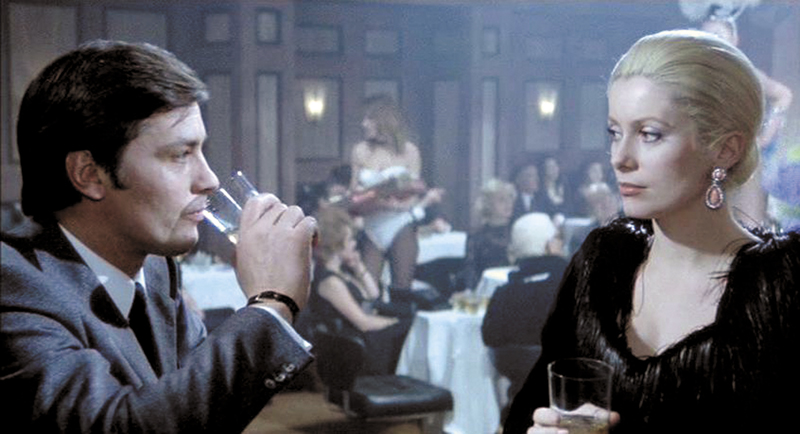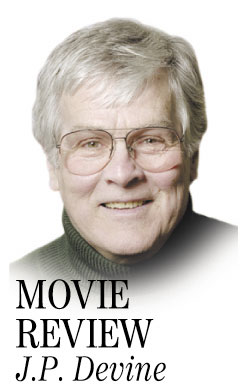“Cherchez la femme, Bucky. Remember that.”
— James Ellroy, The Black Dahlia
It seems only right to include among the 2013 Maine International Film Festival’s nods to the glorious past, one of the great legends of the French New Wave, Jean Pierre Melville.
Melville, a veteran of the French army and a fighter in the resistance during World War II, brought all of his experience to the screen, when he finally got around to his passion, making action thrillers with conflicted heroes.
“Un Flic,” which opened in 1972 under the title “Dirty Money,” was Melville’s last film, and he made it while seriously ill. Melville is probably better known for his “Bob Le Flambeur,” “Army of Shadows,” and a dozen other films.
Melville was a ground-breaker in many ways with his stylistic approach to detail, in costume, movement, sound, sometimes to OCD-like repetition.
“Un Flic” is basically the story of three people: a gorgeous chanteuse moll (the forever glorious Catherine Deneuve, who only has a few lines of dialogue, allowing her to seduce us and her mates with those famous eyes); a bank robber (the very American Richard Crenna in a rare bad guy role); and a cop, the police vice investigator Coleman (the still very pretty Alain Delon). They move through a short passage of time in a rainy Paris.
The film opens with a bank heist on a posh apartment-lined seafront that is deserted on a windswept stormy day, sort of like Atlantic City during Hurricane Sandy.
Four men sit silently in a car with the wipers flicking back and forth. They’re watching a bank. We know they’re not there to use the ATM. One by one they get out, all dressed in trench coats and hats and carrying briefcases. It seems to take an hour. Melville is good about taking his time, never considering that we’re way ahead of him and want him to hurry up. We’re Americans, for Pete’s sake.
Our boys stand around, filling out forms like they’re looking for jobs. Finally, they don sunglasses and handkerchief masks, like old West train robbers, and take out the cash. One is wounded, and this will complicate matters later, of course, as it always did in American gangster movies, of which Melville was a rabid fan.
Inspector Coleman will soon be on the job, cruising through the city streets in his chauffeured limo and smooth Peter Gunn suits, playing eye games with night club singer (Deneuve), tinkling on her piano and her nerves, and buying info from a transvestite snitch. The night club, we discover, is owned as a front by our robber (Crenna), and it seems to take a very long while before Inspector Coleman wises up to the robber’s day job.
Meanwhile, fat with cash, the robber has another job planned, and this one will take up the seemingly last 56 minutes of this 98-minute story. It involves a passel of men with suitcases, a lot of heroin and a night train ride in the French countryside.
This is the part that will delight aging Melville fans, and probably make the smartphone generation giddy.
We get to see Mr. Crenna lowered from a helicopter (a toy helicopter) onto a moving train (clearly a toy train) in the middle of a stormy night (Melville likes stormy nights) in work clothes. He breaks into the train, changes into silk robe and pajamas in a hilariously long and incredibly detailed stretch of time. Probably, in 1972, this worked.
Some viewers, spoiled by Bourne and Bond quick-cut action scenes, may get antsy by watching Crenna carefully lace and unlace his boots. And wait until you see how much equipment he can carry in that Hugh Heffner silk robe.
To be fair, despite the painful attention to details, the whole train thing — once inside and away from the toy shots, robbing the robbers, climbing the walls in a sort of Harold Lloyd version of “Murder on the Orient Express” — is a lot of fun. Did Mr. Melville possess a Hitchcock sense of humor and intend this to be a comedy? Am I not in on the joke?
The very end suggests not. There are no real heroes here, except for the transvestite snitch, who gets a raw deal from our homophobic cop. Or is he? There are some moments, glances, words, that suggest that in better times, such as now, our bank robber and cop might have had some softer moments together. Just saying.
Basically, “Un Flic,” is a sweet museum piece that deserves its place in this festival.
I must add that it was nice to see the late Michael Conrad, an old friend (“Hill Street Blues” ) again, and hear song lyrics by the great Charles Aznavour.
J.P. Devine, of Waterville, is a former stage and screen actor.
Send questions/comments to the editors.




Success. Please wait for the page to reload. If the page does not reload within 5 seconds, please refresh the page.
Enter your email and password to access comments.
Hi, to comment on stories you must . This profile is in addition to your subscription and website login.
Already have a commenting profile? .
Invalid username/password.
Please check your email to confirm and complete your registration.
Only subscribers are eligible to post comments. Please subscribe or login first for digital access. Here’s why.
Use the form below to reset your password. When you've submitted your account email, we will send an email with a reset code.